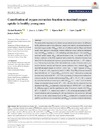Identificador persistente para citar o vincular este elemento:
https://accedacris.ulpgc.es/jspui/handle/10553/73077
| Título: | Contribution of oxygen extraction fraction to maximal oxygen uptake in healthy young men | Autores/as: | Skattebo, Øyvind López Calbet, José Antonio Rud, Bjarne Capelli, Carlo Hallén, Jostein |
Clasificación UNESCO: | 2411 Fisiología humana | Palabras clave: | Arteriovenous Oxygen Difference Cardiac Output Exercise Leg Blood Flow Limiting Factors, et al. |
Fecha de publicación: | 2020 | Proyectos: | Identificacion E Integracion de Nuevos Factores Moleculares, Fisiologicos y Bioelectricos Determinantes Del Rendimiento en El Ejercicio de Sprint | Publicación seriada: | Acta Physiologica | Resumen: | We analysed the importance of systemic and peripheral arteriovenous O2 difference ((Formula presented.) difference and a-vfO2 difference, respectively) and O2 extraction fraction for maximal oxygen uptake ((Formula presented.)). Fick law of diffusion and the Piiper and Scheid model were applied to investigate whether diffusion versus perfusion limitations vary with (Formula presented.). Articles (n = 17) publishing individual data (n = 154) on (Formula presented.), maximal cardiac output ((Formula presented.); indicator-dilution or the Fick method), (Formula presented.) difference (catheters or the Fick equation) and systemic O2 extraction fraction were identified. For the peripheral responses, group-mean data (articles: n = 27; subjects: n = 234) on leg blood flow (LBF; thermodilution), a-vfO2 difference and O2 extraction fraction (arterial and femoral venous catheters) were obtained. (Formula presented.) and two-LBF increased linearly by 4.9-6.0 L · min–1 per 1 L · min–1 increase in (Formula presented.) (R2 =.73 and R2 =.67, respectively; both P <.001). The (Formula presented.) difference increased from 118-168 mL · L–1 from a (Formula presented.) of 2-4.5 L · min–1 followed by a reduction (second-order polynomial: R2 =.27). After accounting for a hypoxemia-induced decrease in arterial O2 content with increasing (Formula presented.) (R2 =.17; P <.001), systemic O2 extraction fraction increased up to ~90% ((Formula presented.) : 4.5 L · min–1) with no further change (exponential decay model: R2 =.42). Likewise, leg O2 extraction fraction increased with (Formula presented.) to approach a maximal value of ~90-95% (R2 =.83). Muscle O2 diffusing capacity and the equilibration index Y increased linearly with (Formula presented.) (R2 =.77 and R2 =.31, respectively; both P <.01), reflecting decreasing O2 diffusional limitations and accentuating O2 delivery limitations. In conclusion, although O2 delivery is the main limiting factor to (Formula presented.), enhanced O2 extraction fraction (≥90%) contributes to the remarkably high (Formula presented.) in endurance-trained individuals. | URI: | https://accedacris.ulpgc.es/handle/10553/73077 | ISSN: | 1748-1708 | DOI: | 10.1111/apha.13486 | Fuente: | Acta Physiologica [ISSN 1748-1708], v. 230(2), e13486 (Octubre 2020) |
| Colección: | Reseña |
Citas SCOPUSTM
60
actualizado el 08-jun-2025
Citas de WEB OF SCIENCETM
Citations
65
actualizado el 22-feb-2026
Visitas
175
actualizado el 04-may-2024
Descargas
225
actualizado el 04-may-2024
Google ScholarTM
Verifica
Altmetric
Comparte
Exporta metadatos
Los elementos en ULPGC accedaCRIS están protegidos por derechos de autor con todos los derechos reservados, a menos que se indique lo contrario.
